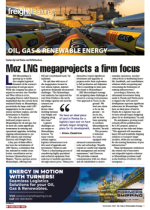The return of Donald Trump to the United States White House had an immediate impact on oil prices, which dropped by more than $2 a barrel when the election outcome was announced, but a day later they had risen by around one percent.This is a sign of the uncertainty in the oil and gas market about the impact of the second Trump presidency on prices.“Conceptually, the impact of a potential second Trump term on oil prices is ambiguous, with some short-term downside risk to Iran oil supply ... and thus upside price risk,” Goldman Sachs commodities analysts wrote in a research paper.His incoming administration is expected to tighten sanctions on Iran and Venezuela, which will have an impact on global supply.An increase in US oil production is expected to be high on the agenda of the “drill, baby, drill” president. In his acceptance speech, Trump said, “we have more liquid gold oil and gas. We have more liquid gold than any country in the world. More than Saudi Arabia, we have more than Russia”.Analysts point out that there is little room for expansion as the United States pumps out 22% of total global production, making it the world’s biggest producer, according to the Energy Information Administration.Oil companies will be reluctant to risk a drop in prices due to increased supply. Americans may need more oil to feed their gas-guzzling vehicles. As a global warming denialist, Trump is expected to put a spoke in the wheel of American plans to decarbonise – which is good news for oil producers.“The incoming administration has taken a real wrecking ball approach to global diplomacy, not just climate diplomacy, but diplomacy in general,” said Rachel Cleetus of the American think-tank Union of Concerned Scientists, in several interviews after the election.The bad news for oil producers is that a return by Trump to trade wars with most of the rest of the world could dampen economic growth and therefore demand for oil and gas.Closer to home, investors in the gas fields off Mozambique and Namibia will be keeping a close eye on developments.Olivier Le Peuch, chief executive officer of SLB, the world’s largest offshore drilling company, reported in the company’s third quarter results that “some international producers exercised cautious spending, triggered by lower oil prices and ample global supply, while land activity in the US remained subdued”.On a positive note for the region, SLB has been awarded a three-year integrated contract for well construction and reservoir characterisation services in Namibia. ER

